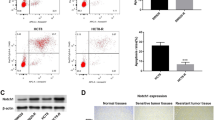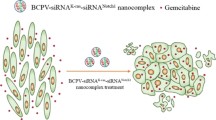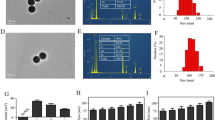Abstract
Apoptosis disorder is generally regarded as an important mechanism of carcinogenesis. Inducement of tumor cell apoptosis can be an effectual way to treat cancer. Bcl-2-associated athanogene 1 (Bag-1) is a positive regulator of Bcl-2 which is an anti-apoptotic gene. Bag-1 is highly expressed in colorectal cancer, which plays a critical role in promoting metastasis, poor prognosis, especially in anti-apoptotic function, and is perhaps a valuable gene target for colorectal cancer therapy. Recently, we applied a novel non-viral gene carrier, magnetic gold nanoparticle, and mediated plasmid pGPH1/GFP/Neo-Bag-1-homo-825 silencing Bag-1 gene for treating colorectal cancer in vivo and in vitro. By mediating with magnetic gold nanoparticle, siRNA plasmid was successfully transfected into cell. In 3-[4,5-dimethylthiazol-2-yl]-2,5 diphenyl tetrazolium bromide (MTT) assay, magnetic gold nanoparticle had no significant cytotoxicity and by which delivered RNA plasmid inhibited cell viability significantly (P < 0.05). Downregulation of Bag-1 promoted cell apoptosis (∼47.0 %) in vitro and significantly decreased tumor growth when the cells were injected into nude mice. Based on the studies in vivo, the relative expression of Bag-1 was 0.165 ± 0.072 at mRNA level and ∼60 % at protein level. In further study, C-myc and β-catenin, mainly molecules of Wnt/β-catenin pathway, were decreased notably when Bag-1 were silenced in nanoparticle plasmid complex-transfected Balb c/nude tumor xenograft. In conclusion, Bag-1 is confirmed an anti-apoptosis gene that functioned in colorectal cancer, and the mechanism of Bag-1 gene causing colorectal cancer may be related to Wnt/β-catenin signaling pathway abnormality and suggested that magnetic gold nanoparticle-delivered siRNA plasmid silencing Bag-1 is an effective gene therapy method for colorectal cancer.





Similar content being viewed by others
References
Torre LA, Bray F, Siegel RL, Ferlay J, Lortet-Tieulent J, Jemal A. Global cancer statistics, 2012. CA Cancer J Clin. 2015;65:87–108.
El-Shami K, Oeffinger KC, Erb NL, Willis A, Bretsch JK, Pratt-Chapman ML, et al. American Cancer Society colorectal cancer survivorship care guidelines. CA Cancer J Clin. 2015;65:427–55.
Ahmed FE. Gene-gene, gene-environment & multiple interactions in colorectal cancer. J Environ Sci Health C Environ Carcinog Ecotoxicol Rev. 2006;24:1–101.
Hassan M, Watari H, AbuAlmaaty A, Ohba Y, Sakuragi N. Apoptosis and molecular targeting therapy in cancer. BIOMED RES INT. 2014;2014:150845.
Hinitt CA, Wood J, Lee SS, Williams AC, Howarth JL, Glover CP, et al. BAG-1 enhances cell-cell adhesion, reduces proliferation and induces chaperone-independent suppression of hepatocyte growth factor-induced epidermal keratinocyte migration. EXP CELL RES. 2010;316:2042–60.
Liu H, Lu S, Gu L, Gao Y, Wang T, Zhao J, et al. Modulation of BAG-1 expression alters the sensitivity of breast cancer cells to tamoxifen. CELL PHYSIOL BIOCHEM. 2014;33:365–74.
Ozfiliz P, Arisan ED, Coker-Gurkan A, Obakan P, Eralp TN, Dinler-Doganay G, et al. Bag-1L is a stress-withstand molecule prevents the downregulation of Mcl-1 and c-Raf under control of heat shock proteins in cisplatin treated HeLa cervix cancer cells. Asian Pac J Cancer Prev. 2014;15:4475–82.
Li P, Wang YD, Cheng J, Chen JC, Ha MW. Association between polymorphisms of BAG-1 and XPD and chemotherapy sensitivity in advanced non-small-cell lung cancer patients treated with vinorelbine combined cisplatin regimen. Tumour Biol. 2015;36(12):9465–73.
Yoshino K, Motoyama S, Koyota S, Shibuya K, Usami S, Maruyama K, et al. IGFBP3 and BAG1 enhance radiation-induced apoptosis in squamous esophageal cancer cells. Biochem Biophys Res Commun. 2011;404:1070–5.
Kabbage M, Dickman MB. The BAG proteins: a ubiquitous family of chaperone regulators. CELL MOL LIFE SCI. 2008;65:1390–402.
Collard TJ, Urban BC, Patsos HA, Hague A, Townsend PA, Paraskeva C, et al. The retinoblastoma protein (Rb) as an anti-apoptotic factor: expression of Rb is required for the anti-apoptotic function of BAG-1 protein in colorectal tumour cells. CELL DEATH DIS. 2012;3, e408.
Sun N, Meng Q, Tian A. Expressions of the anti-apoptotic genes Bag-1 and Bcl-2 in colon cancer and their relationship. AM J SURG. 2010;200:341–5.
Skeen VR, Collard TJ, Southern SL, Greenhough A, Hague A, Townsend PA, et al. BAG-1 suppresses expression of the key regulatory cytokine transforming growth factor beta (TGF-beta1) in colorectal tumour cells. ONCOGENE. 2013;32:4490–9.
Clemo NK, Collard TJ, Southern SL, Edwards KD, Moorghen M, Packham G, et al. BAG-1 is up-regulated in colorectal tumour progression and promotes colorectal tumour cell survival through increased NF-kappaB activity. CARCINOGENESIS. 2008;29:849–57.
Djuranovic S, Nahvi A, Green R. A parsimonious model for gene regulation by miRNAs. SCIENCE. 2011;331:550–3.
Sun NF, Tian AL, Liu ZA, Hu SY, Hu AB. Antiapoptotic gene BAG-1 vector structure of RNA interference and endogenous targeted screening in colon cancer cell lines. Tumour Biol. 2014;35:1057–63.
Noguchi T, Takeno S, Shibata T, Fumoto S, Uchida Y, Yokoyama S, et al. Nuclear BAG-1 expression is a biomarker of poor prognosis in esophageal squamous cell carcinoma. DIS ESOPHAGUS. 2003;16:107–11.
Zhang W, Tang W, Inagaki Y, Qiu M, Xu HL, Li X, et al. Positive KL-6 mucin expression combined with decreased membranous beta-catenin expression indicates worse prognosis in colorectal carcinoma. ONCOL REP. 2008;20:1013–9.
Malamas AS, Gujrati M, Kummitha CM, Xu R, Lu ZR. Design and evaluation of new pH-sensitive amphiphilic cationic lipids for siRNA delivery. J CONTROL RELEASE. 2013;171:296–307.
Wittrup A, Lieberman J. Knocking down disease: a progress report on siRNA therapeutics. NAT REV GENET. 2015;16:543–52.
Townsend PA, Stephanou A, Packham G, Latchman DS. BAG-1: a multi-functional pro-survival molecule. Int J Biochem Cell Biol. 2005;37:251–9.
van der Zee JA, Ten HT, Hop WC, van Dekken H, Dicheva BM, Seynhaeve AL, et al. Bcl-2 associated anthanogen-1 (Bag-1) expression and prognostic value in pancreatic head and periampullary cancer. EUR J CANCER. 2013;49:323–8.
Knee DA, Froesch BA, Nuber U, Takayama S, Reed JC. Structure-function analysis of Bag1 proteins. Effects on androgen receptor transcriptional activity. J BIOL CHEM. 2001;276:12718–24.
Schmidt U, Holsboer F, Rein T. Role of the hsp70 cochaperone BAG1 in glucocorticoid receptor function and stress-related diseases. Proc Natl Acad Sci U S A. 2008;105:E101–2.
Brendel A, Felzen V, Morawe T, Manthey D, Behl C. Differential regulation of apoptosis-associated genes by estrogen receptor alpha in human neuroblastoma cells. Restor Neurol Neurosci. 2013;31:199–211.
Afentakis M, Dowsett M, Sestak I, Salter J, Howell T, Buzdar A, et al. Immunohistochemical BAG1 expression improves the estimation of residual risk by IHC4 in postmenopausal patients treated with anastrazole or tamoxifen: a TransATAC study. Breast Cancer Res Treat. 2013;140:253–62.
Aust S, Pils S, Polterauer S, Horvat R, Cacsire CD, Pils D, et al. Expression of Bcl-2 and the antiapoptotic BAG family proteins in ovarian cancer. Appl Immunohistochem Mol Morphol. 2013;21:518–24.
Mashukova A, Kozhekbaeva Z, Forteza R, Dulam V, Figueroa Y, Warren R, et al. The BAG-1 isoform BAG-1M regulates keratin-associated Hsp70 chaperoning of aPKC in intestinal cells during activation of inflammatory signaling. J CELL SCI. 2014;127:3568–77.
Maki HE, Saramaki OR, Shatkina L, Martikainen PM, Tammela TL, van Weerden WM, et al. Overexpression and gene amplification of BAG-1L in hormone-refractory prostate cancer. J PATHOL. 2007;212:395–401.
Southern SL, Collard TJ, Urban BC, Skeen VR, Smartt HJ, Hague A, et al. BAG-1 interacts with the p50–p50 homodimeric NF-kappaB complex: implications for colorectal carcinogenesis. ONCOGENE. 2012;31:2761–72.
Ni W, Chen B, Zhou G, Lu C, Xiao M, Guan C, et al. Overexpressed nuclear BAG-1 in human hepatocellular carcinoma is associated with poor prognosis and resistance to doxorubicin. J CELL BIOCHEM. 2013;114:2120–30.
Sun NF, Meng QY, Hu SY, Tian AL, Wang RH, Liu ZX, et al. Correlation between the expression of the BAG-1 gene and clinicopathologic factors in colorectal cancer. J Cancer Res Clin Oncol. 2011;137:1419–24.
Huang B, Zhou H, Lang X, Liu Z, Xiong F, Wang S. Expression of BAG-1 is closely related to cell differentiation and TNM stage in esophageal cancer and its downregulation inhibits the proliferation and invasion of human esophageal carcinoma cells. ONCOL REP. 2014;32:1441–6.
Liu H, Liang Y, Li Y, Li Y, Wang J, Wu H, et al. Gene silencing of BAG-1 modulates apoptotic genes and sensitizes lung cancer cell lines to cisplatin-induced apoptosis. CANCER BIOL THER. 2010;9:832–40.
Son S, Namgung R, Kim J, Singha K, Kim WJ. Bioreducible polymers for gene silencing and delivery. Acc Chem Res. 2012;45:1100–12.
Zhou H, Choi SI, Zou F, Oh S, Kim JE, Hwang DY, et al. Cytotoxicity and gene expression in sarcoma 180 cells in response to spiky magnetoplasmonic supraparticles. ACS Appl Mater Interfaces. 2014;6:19680–9.
Vijayanathan V, Thomas T, Thomas TJ. DNA nanoparticles and development of DNA delivery vehicles for gene therapy. BIOCHEMISTRY-US. 2002;41:14085–94.
Jang GB, Kim JY, Cho SD, Park KS, Jung JY, Lee HY, et al. Blockade of Wnt/beta-catenin signaling suppresses breast cancer metastasis by inhibiting CSC-like phenotype. Sci Rep. 2015;5:12465.
Yoshida N, Kinugasa T, Ohshima K, Yuge K, Ohchi T, Fujino S, et al. Analysis of wnt and beta-catenin expression in advanced colorectal cancer. ANTICANCER RES. 2015;35:4403–10.
Leung WK, He M, Chan AW, Law PT, Wong N. Wnt/beta-catenin activates MiR-183/96/182 expression in hepatocellular carcinoma that promotes cell invasion. CANCER LETT. 2015;362:97–105.
Mir R, Pradhan SJ, Patil P, Mulherkar R, Galande S. Wnt/beta-catenin signaling regulated SATB1 promotes colorectal cancer tumorigenesis and progression. ONCOGENE. 2015.
Acknowledgments
This study was supported by grants from Independent Innovation Foundation of Shandong University (Grant No. 2011JC016), Natural Science Foundation of Shandong Province (Grant No. ZR2012HM002), and Found of China Postdoctoral Science (Grant No. 20100481271).
Author information
Authors and Affiliations
Corresponding author
Ethics declarations
Conflicts of interest
None
Rights and permissions
About this article
Cite this article
Huang, W., Liu, Z., Zhou, G. et al. Silencing Bag-1 gene via magnetic gold nanoparticle-delivered siRNA plasmid for colorectal cancer therapy in vivo and in vitro. Tumor Biol. 37, 10365–10374 (2016). https://doi.org/10.1007/s13277-016-4926-0
Received:
Accepted:
Published:
Issue Date:
DOI: https://doi.org/10.1007/s13277-016-4926-0




